27. Sep 2024 - DOI 10.25626/0150
Anastasia Felcher works as a Slavic archivist at the Blinken OSA Archivum in Budapest and teaches at the Cultural Heritage Studies Program at the Central European University (CEU) in Vienna. She obtained her PhD in Management and Development of Cultural Heritage from the IMT School for Advanced Studies Lucca, has held several academic fellowships throughout Europe, and has taken part in three research projects with external funding over the last ten years. Her research interests include the cultural history of borderlands in East-Central Europe, memory studies, and minority histories. She is currently a fellow at the Imre Kertész Kolleg at the Universität Jena, where she works on the transnationality of Eastern European Holocaust memory.
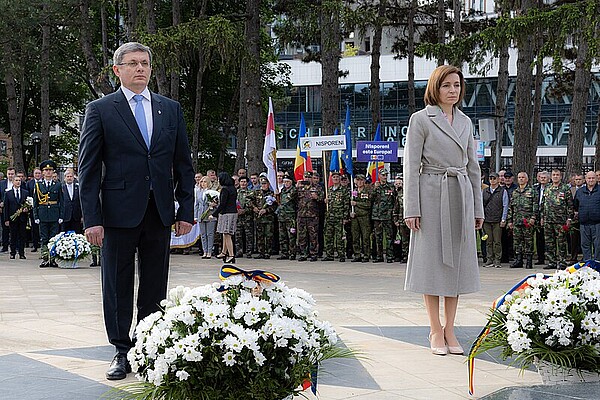
In early May 2024, turbulence gripped Moldova’s public sphere. As in years past, questions swirled around how the country would commemorate 9 May. For decades, the day had been celebrated as Victory Day. In some places, the day is a national holiday, and in countries that were either former republics of the USSR or have large numbers of residents from the former Soviet diaspora, the celebrations continue to draw large crowds, though its meaning has shifted in some countries like Ukraine.[1] However, many countries have refrained from holding these celebrations since Putin’s Russia appropriated the day for its own ends, which include its criminal seizure of territory, praise of Russia’s purported military might after 1991, and propagation of nostalgia for the bygone dominance of the Soviet Union.
In Moldova, the smallest and poorest of the former Soviet republics, 9 May has become a contentious event. Apart from paying tribute to the end of the Second World War, it is used to demonstrate non-partisan political unity. The nation has been shaped by opposing geopolitical forces for years and has been drained by post-independence labour emigration. Over the past few years, the government has taken advantage of the occasion’s unabated mobilizing power by actively incorporating pro-European politics into 9 May festivities in two distinct ways. First, the government has shifted the ceremonies from a celebration of the USSR’s victory into an occasion to champion Europe. Second, the construction of a ‘European village’ in the heart of Chișinău has facilitated the transformation of 9 May from Victory Day to Europe Day (figure 1).
For the last fourteen years, promoting Europe Day has been a priority for some Moldovan politicians.[2] Prior to 2024, Europe Day celebrations took place at the end of the week that included 9 May, and the European village was usually set up in the park in Chișinău’s city centre. Numerous European countries, together with EU organizations and institutions, would set up booths to inform the public about the accomplishments of Europe and offer visitors a taste of regional cuisines. Held on a weekend day to accommodate a larger number of attendees, the event combined political campaigning with recreation.
Nonetheless, the use of May 9 to promote Europe and European Union accession did not become a state-sponsored spectacle until after a liberal, pro-European party assumed power after winning the snap parliamentary elections in 2021. The Party of Action and Solidarity (PAS) presently holds the majority of seats in parliament as well as the presidency, which is occupied by the party’s founder, Maia Sandu. The primary foreign policy goal of the president, cabinet, and parliament is Moldova’s European integration. Orientation towards the West was likewise part of the platform of many past administrations. However, the ongoing war in Ukraine has put Moldova’s pursuit of EU membership at the centre of its foreign policy and has, as a result, shaped the 9 May events.
Moldova applied for EU membership in March 2022, a week after Russia attacked Ukraine. In June of the same year, Moldova was given candidate status (together with Ukraine), with 2030 as the target year for EU accession. This expedited admission to EU candidacy was undoubtedly a triumph of Moldovan diplomacy, a point that the present administration never tires of emphasizing (figure 2). (However, this has not absolved the government from opposition criticism, which maintains that Moldova’s candidate status was brought about by the current war rather than actual domestic structural changes.) As a result, commemorating Europe Day has the potential to inspire national mobilization. A referendum on joining the EU is scheduled to coincide with the presidential election in fall 2024, raising the stakes even higher.
This article analyses the last four years of 9 May celebrations in Moldova after Sandu was elected president in late 2020 and the ways in which the current liberal, centrist government has reinterpreted the significance of 9 May. The government began the transformation of 9 May from Victory Day to Europe Day without, however, reducing it to a simple deification of Europe. While they have sought to continue to honour those who fell in the Second World War, they have had inconsistent success in reaching those who value the commemoration of 9 May as Victory Day. At the same time, the shift sought to move Moldova away from any remaining similarities with celebrations in Putin’s Russia and towards European memory culture. Interestingly, parties on both the left and the right objected to the move. Over the past four years, various parties have visited different symbolic sites of the capital on 9 May. By giving places that had previously never had a ‘European’ connotation new meaning, they were redesigning the symbolic geography of Chișinău.
The tension between Europe Day and Victory Day in Moldova stems from the country’s contemporary political climate. But a closer look at the history of both memorial events makes it seem confounding that the celebrations would be viewed in opposition to one another. The commemoration of the Axis forces’ defeat and the end of the Second World War takes place on the anniversary of Nazi Germany’s unconditional capitulation on 8 May 1945. Victory over Fascism Day, also known as Victory in Europe Day, or VE Day, is observed across the continent. Owing to time zone differences, the victory was celebrated in the Soviet Union (and, after its dissolution, in Russia and a few newly independent republics) a day later, as the surrender took effect at 23:01 CET, which was 00:01 in Moscow.[3] The war had a direct impact on Robert Schuman’s proposal to place French and West German coal and steel production under the control of a single authority, which marked the first step towards European integration. The Schuman Declaration, as it came to be known, was put forward in Paris on 9 May 9 1950, five years after the war ended. Thirty five years later, the leaders of European states convened in Milan in 1985 and formally declared 9 May to be Europe Day, dedicated to honouring peace and unity throughout the continent.
Six months before Moldova gained independence, in late 1990, the Supreme Council of the Moldovan SSR passed a resolution on holidays, rest days, and days of remembrance. It established the Day of Victory and Memory for the Fallen Heroes for the Independence of the Motherland as a holiday on 9 May. Since then, Moldovan leaders have taken part in the 9 May festivities to varying degrees. From a foreign policy perspective, celebrating this occasion as the Day of Victory was closely linked to demonstrating loyalty to Russia. For instance, on 9 May 2017, the explicitly pro-Russian president of Moldova at the time, Igor Donon, travelled to Moscow to attend the Victory Day military parade on Red Square (figure 3). The parade commemorated the 72nd anniversary of the surrender of Nazi Germany. Dodon was the only foreign head of state to attend it, as Russia had become isolated internationally due to the annexation of Crimea in 2014.
In late April 2017, just a few days before the visit, iMoldovan legislators proposed a resolution to have Europe Day celebrated on 9 May. The purpose of the legislative changes was to highlight Moldova’s sense of European belonging as a member of the Council of Europe and as a nation that, together with Ukraine and Georgia, had signed an association agreement with the EU three years prior. Still, over the years, a range of actors from across the political spectrum have urged their followers to embrace only European Day or Victory Day. What has remained unchanged, though, are the strong emotions and high stakes linked to 9 May.
Moldova’s decision to make Europe Day a holiday in 2017 ignited political controversy. The government had a pro-European stance, although there were questions about how independent its decision-making was. The period from 2016 to 2019 is referred to by many as the ‘captured state’ era, during which the oligarch Vlad Plahotniuc, leader of the Democratic Party of Moldova (PDM), greatly consolidated his power. Although he did not officially hold a powerful position in government, he exerted significant influence over law enforcement, the legislature, and the judicial system. Plahotniuc’s outspoken pro-European position enabled him to consistently win European investments and subsidies for Moldova. However, whether this money was spent on the purposes it was intended for remained a subject of doubt. Eventually, the foreign money infusion fuelled the oligarch’s expanding network of control through corruption, rather than bringing about the reforms required for accession to the European Union. Because EU officials continued to do business with Plahotniuc, whose reputation had long been tainted, the public’s opinion of the European Union soured.
Dodon refused to sign the legislation consecrating Europe Day, insisting that members of parliament reconsider it. However, they left it unchanged and passed it again. Because “under Moldovan law, the president has the power to reject a bill once but is obliged to sign it into law if lawmakers vote for it again,”[4] the Constitutional Court temporarily stripped him of his powers to enable passage of the law. The legislation took months to go into effect as a result of these detours. Dodon fiercely protested against celebrating Europe on 9 May. He believed that by establishing a holiday on the same day as Victory Day, the members of parliament intended to downplay the significance of the memory of the Second World War and the price paid to defeat Nazism. He was especially concerned about the memory of the twenty-seven million lives that the USSR lost during the war, which included soldiers, civilians, and people murdered in concentration camps.
Dodon promised his voters that he would repeal the law after the next parliamentary elections, scheduled for 2019, assuming that his party, the Party of Socialists (PSRM), would win. When this did not happen exactly as the socialists planned, PSRM members in the newly elected parliament proposed a bill inspired by Dodon that would move the celebration of Europe Day from 9 May to 8 May. The stated purpose was to avoid “misunderstandings” about which holiday people should celebrate.[5] The bill was not approved by a parliamentary majority, leaving both holidays to be commemorated on the same date.
In 2019, the socialist legislators sought to mount a more effective challenge to the oligarch Plahotniuc by joining an erratic, paradoxical coalition in the newly elected parliament with the new liberal centre-right parties – the PAS and the Dignity and Truth Platform (DA) – that have lately ascended to power in Moldova. The trio was able to oust Plahotniuc from government, after which he left Moldova for Turkey and never returned. However, the coalition members’ disagreements over a wide range of issues led to a breakup. Subsequently, the parliament was dissolved for failing to establish a government, which gave liberal parties a chance to seize the majority in the July 2021 snap elections.
Two months before the elections, the first 9 May celebrations of Sandu’s presidency took place, which were also the first since the start of the COVID-19 pandemic.[6] Sandu won the race for president in late 2020 by campaigning on domestic reforms and the fight against corruption rather than geopolitics. While not hiding her support for the unification of Moldova and Romania – also known as pan-Romanianism or unionism – Sandu sought to draw support from voters across the political spectrum. She claimed that she would be a “president for everyone” in both national and international politics. This meant supporting minorities inside the country and maintaining a pro-European foreign policy while acknowledging the value of maintaining ties with Russia, which was particularly important for the continued availability of cheap gas to heat the country in the winter. Early on 9 May 2021, Sandu paid her respects to the victims of the Second World War by visiting the Eternity Memorial Complex (figure 4). Later in the day, she issued a recorded address to the country in which she talked about remembering the war, the lives of Moldovans under communist dictatorship, and European values.[7] Sandu placed less significance on the Victory Day component of 9 May by focusing on the narrative that Moldova had been robbed of its resources and people by two totalitarian regimes. In their own statement about 9 May, members of her party, the PAS, wrote that they celebrated the victory of the United Nations and the anti-Hitler coalition, without mentioning the Soviet Union by name.[8] These statements infuriated many who commemorated 9 May as the day that Soviet forces triumphed in the Great Patriotic War (also referred to by some as the Soviet-German War).
Alternative actors stepped in to fill the void left by the government’s reluctance to put on a military parade or any other major tribute to the end of the Second World War beyond Sandu’s visit to the memorial. Activists aligned with the Moldovan branch of Rossotrudnichestvo (the Russian state’s foreign aid agency), such as the Pobeda coordination committee and other grassroots actors, organized events that were modelled on the commemorations in Russia, which culminated in March of Victory and Immortal Regiment processions.[9] Participants carried photos of relatives who had lost their lives in combat or had received medals for serving on the home front. Political party leaders from the left (Party of Communists (PCRM) and PSRM) took part in the marches, demonstrating their firm support for celebrating Victory Day on 9 May as well as their patronage from Moscow. The Chișinău Immortal Regiment march in 2021 drew over 15,000 attendees, many of whom wore ribbons of Saint George. In the mid-2000s, the orange and black ribbon began to be used in Russia as a symbol of the country’s triumph in the Second World War. Over time, the symbol came to represent allegiance to the Kremlin (figure 5).
Centre-right and right-wing Moldovan politicians also got upset with the president. Sandu had needed the backing from beyond the political left in order to win the presidential elections five months prior. After first nominating their own candidates, some subsequently withdrew and sided with Sandu for the express purpose of defeating Dodon. Yet her actions as the “president for everyone” after she won the election did not meet their expectations. They felt uneasy about the president’s 9 May visit to the Eternity memorial, perceiving it as a sign of political conformity. For example, the leader of the pro-unionist Party of National Unity (PUN), Octavian Țîcu, asserted that Sandu did not speak for him that morning at “the memorial of lies”.[10] His dissatisfaction stemmed from the memorial’s close association with the Soviet cult of victory. Moreover, the memorial has been connected with the political left in contemporary Moldovan history, even though it has ultimately been used by all parties in power.[11] The memorial was opened in 1975 to commemorate the thirtieth anniversary of the Soviet Union winning the war. Since then, it has become a site of memory with multilayered meanings. Politicians in government have often conducted official ceremonies there, while leaders of opposition political movements have made it the destination of marches. The memorial was renamed “Eternity” in 2006 following renovations sponsored by the PCRM and now features a statue honouring the Dniester River military conflict of 1990–92. Nevertheless, its architectural design still bears the imprint of the Soviet cult of victory.
Because of the memorial’s history, other political figures committed to the ‘European’ interpretation of 9 May chose not to join Sandu on her visit to it. Instead, the leader of the DA party Andrei Năstase and its members honoured the dead by visiting the Heroes’ Cemetery, another multilayered memory site in Chişinău. It originated in the nineteenth century as a military cemetery when the territory of what is today Moldova was part of the Russian Empire. Military personnel from the garrison in the city were buried there. The cemetery later served as the final resting place for First World War combatants of many nationalities. The cemetery was redesigned in the 1930s, when Greater Romania ruled over much of the same territory. After the Second World War started, soldiers were buried at the cemetery once again. Initially, fallen Romanian soldiers were buried there. After extensive renovations funded by the Romanian government, the cemetery was given its current name when it reopened during King Mihai I’s visit to Chişinău in 1942. After Germany’s surrender, prisoners of war who were forced to rebuild the city were buried there. As a result of Chişinău’s extensive destruction, the Soviet administration extensively remodelled it again. In the run of the 1950s and 1960s, they disinterred the remains of the dead in this and many other old cemeteries in Moldova.[12]
Despite its central location, the cemetery’s grounds had become an abandoned lot overgrown with grass and plants by the 2020s (figure 6). The cemetery holds graves not only of Romanian soldiers, but also of Russian, Hungarian, Czech, French, German, and Italian soldiers who died in both world wars. Today, however, it is mainly associated with interwar – which is to say, Romanian – and Second World War Moldovan history. Năstase chose to visit the cemetery on 9 May 2021 rather than the Eternity memorial in an effort to shift Moldova’s Second World War memory culture and practices away from the Soviet-designed memorial. During his address, Năstase emphasized that 9 May is Europe Day and urged people to pursue a shared goal of establishing closer ties with the EU.[13] He argued that giving the former military cemetery a new, ‘European’ meaning would make it a more appropriate site for remembering the wars.
Inspired by Năstase’s address, legislation to add the Heroes’ Cemetery to the list of state-protected monuments was drafted by DA members of parliament. In early 2023, the mayor of Chişinău declared that restoration work at the former cemetery would start (figure 7). Romania, which has frequently assisted in the restoration of cultural heritage sites in Moldova over the years, contributed a significant portion of the funds. The plan is to create a monument to the soldiers who lost their lives in both world wars. The realization of this plan would provide further rationale for considering the cemetery as an alternative memorial site for 9 May commemorations. A year after the restoration work began, two smaller monuments were erected in the former cemetery. One is dedicated to the Czechoslovak legionnaires who lost their lives in Chişinău in 1917 on the march from Romania to France. The second memorial commemorates the Romanian soldiers, called heroes, who perished during the First World War, as well as those who died during the recapture of the city from the Red Army in 1941 (figure 8). Unlike the Eternity memorial, this small monument in the Heroes’ Cemetery refers to the Romanian troops as liberators, even though they had allied themselves with the Axis powers in 1940.
The state of affairs in the region was drastically altered on 24 February 2022, when Russia initiated an unprovoked invasion of Ukraine. The authorities in Moldova, as noted above, pushed for EU membership with greater urgency soon after the war broke out. These developments had a significant impact on Moldova’s observance of 9 May and how citizens felt about the day. The ribbon of Saint George and the letters V and Z were adopted by Russian propaganda for the war, which called it a “special military operation”. This propaganda sought to blend new military objectives with the cult of victory. Three weeks before 9 May 2022, the Moldovan parliament passed a law sponsored by the PAS that banned the use of these symbols and any others deemed to promote acts of military aggression, war crimes, and crimes against humanity; violations are punishable with a hefty fine.[14] The government accomplished two goals with this prohibition. First, they reduced the visible presence of Victory Day events on 9 May and, second, they hindered the spread of ‘Z’ propaganda in Moldova.
Opposition politicians engaged in a campaign to counter this shift in memory culture. Members of the populist party ȘOR joined forces with leaders of the Gagauz autonomy movement to oppose the prohibition of the ribbon of Saint George. This new alliance emerged as a rival to the PCRM and PSRM on the political left. Moscow has consistently backed the populists and leaders of the autonomy movement, while communists and socialists have lost much of their prior influence. The ȘOR Party assumed an active role in promoting Russophilic, Eurosceptic interventions in Moldova’s memory culture, continuing a tradition established by the PCRM and PSRM. The ȘOR Party functioned without its leader, oligarch Ilan Shor, who in 2019 fled to Israel in order to avoid facing criminal charges related to the theft of one billion US dollars from Moldovan banks in 2014.[15]
The ban on the ribbon of Saint George posed a problem for those who wanted to commemorate Victory Day on 9 May 2022, as they were left without the visual code that had become popular in Russian observations of the event. The organizers of the March of Victory and Immortal Regimen processions had to improvise. They raised red victory banners as the primary emblem of Victory Day, while the crowd wore orange and black clothing. Some ignored the ban and wore ribbons of Saint George anyways, but they were fined by the police. The procession moved from the city centre to the Eternity memorial, much like in past years. Despite the large turnout for the procession, it did not receive much attention, as the public was more concerned with the ongoing refugee crisis and the war that had erupted only two months before.
On 8 May 2022, Sandu addressed the country, urging people to celebrate peace and highlighting the significance of Europe Day. She made it clear that there would be no 9 May parade in Moldova. Rather, Sandu was in favour of peaceful demonstrations, meetings, and memorial services for the dead. She further dissociated herself from the Victory Day events by avoiding the Eternity memorial (though the official reason given was health concerns); the speaker of parliament and prime minister Natalia Gavrilița went in her place. In a speech held at the memorial, Gavrilița asserted that debating whether the Soviet Union or Europe was victorious in the Second World War was divisive rhetoric. She emphasized that talking about reconciliation was more appropriate for the occasion, because many Moldovan families had relatives who served in both the Romanian military and the Red Army.
The year 2022 was challenging for Moldovan officials. Hundreds of thousands of refugees arrived as a result of the war in Ukraine; some of them chose to stay and wait for the fighting to end. Moldova decided to move from Russian to European gas suppliers, and the restricted borders with Ukraine disrupted the food supply. As a result, prices in Moldova skyrocketed, putting housing, utilities, and daily expenditures beyond reach for many Moldovans. The ȘOR Party called for the resignation of the government and staged sizable, continuous protests over escalating costs of living. This indicated that out of all remaining actors on the left, it was the party of the runaway oligarch that had the capacity to compete with the PAS. Later that year, the government revoked the broadcast licences of six television stations on allegations that they were disseminating false information about domestic issues and the war in Ukraine. Since several of these channels had ties to Shor, some suspected that the ban was actually intended to target the governing party’s political rivals rather than to shut out pro-Russian propaganda.
In 2023, the government and the president limited their observation of the 9 May remembrance ceremonies to an early morning visit to the Eternity memorial. Sandu addressed the country on Facebook by highlighting Europe’s role as a peacemaker, denouncing acts of violence, and stating that patriotism is incompatible with murder. The leftist opposition and Russia-friendly NGO’s organized two larger marches. The first one was the Immortal Regiment march organized by the Russian ambassador to Moldova, the PCRM, PSRM, and the Pobeda committee. The crowd wore ribbons of Saint George (in violation of the prohibition of 2022) and carried red banners of victory with the hammer and sickle as well as images of Stalin. Curiously, the attendees had paper clippings shaped like white doves, mirroring the government’s discourse on the value of peace.[16] The ȘOR Party put on a different march, indicating that they could still arrange large gatherings and maintain their standing as one of the nation’s major left-wing parties.
Two weeks following this celebration, PAS lawmakers proposed changing the day commemorating the end of the Second World War from 9 May to 8 May to better align with European conventions. They also suggested renaming it from Victory Day to the Day of Remembrance and Reconciliation in Memory of Those Who Perished in the Second World War. The socialist deputies protested against the measure in front of the parliament building, causing considerable tension. After two weeks, PAS deputies modified the bill to designate the day as the Day of Victory over Nazism and the Memory of Those Who Perished in the Second World War. They argued that since Moldovans had contributed to defeating Nazism, the new name would honour this accomplishment while giving the people a sense of belonging to a common European project. In the end, the bill was never passed, but it created a great deal of international controversy and prompted Russia to issue a warning. Both Dodon and Shor protested on social media, with Shor arguing that his party wished to preserve the “pure” memory of the war.[17]
There was more to Europe Day celebrations that year than assembling the traditional European village in the park. The extent of the festivities suggested that the government had dedicated significant resources to providing entertainment for a large crowd. The event in Chişinău included a concert with local bands, Moldovan rock and rap icons, and a live broadcast of the Eurovision final from Liverpool. A week later, on 21 May 2023, the government held a large pro-European rally called the European Moldova National Assembly, which drew about 100,000 participants. The gathering took place at the same location as the 1989 protests against the Soviet government that had controlled Moldova for forty-five years. Interestingly, Victory Day parades had been held in the same square during the period of Soviet rule, and the square was referred to as Victory Square. Sandu participated in this major political gathering alongside high-ranking Moldovan and EU politicians. The assembly symbolically passed a number of resolutions to reaffirm Moldova’s unwavering commitment to joining the EU by 2030.
But the political unrest of 2022 continued unabated. The protests organized by the opposition in the centre of Chişinău and other towns that were entering their second year may have prompted the European assembly. In reaction to the rally, the ȘOR Party planned demonstrations on the same day, but they were unable to hold them in Chişinău, so they relocated to a number of smaller Moldovan municipalities. The counter-protests demanded a referendum that would define the course of Moldovan foreign policy. The opposition stated that support for orientation towards Europe was not unanimous and that it should be discussed in an open vote rather than at diplomatic summits. In the end, though, the primary organizer of the protests, the ŞOR Party, was outlawed in Moldova because of concerns that it was destabilizing the country. Still, this did not deter the party from planning public events or being active on social media.
Moldova’s intelligence agency, the Security and Intelligence Service, suspended another twenty-two pro-Russian television networks in October 2023 on the grounds that they supported Putin and were spreading Russian propaganda. Although some of the broadcasters were in fact run by Russian officials, their prohibition resulted in a reduction of Russian-language programming, including content that backed celebrating 9 May as Victory Day. The prohibition is still in place despite criticisms that the government and the president forced it through in order to consolidate power and undermine the rights of national minorities.
The confrontation between Europe Day and Victory Day on 9 May 2024 was widely publicized. The head of the EU delegation to Moldova, Janis Mazeiks, implored that there should be no conflict between commemorating the end of the war and the founding of the EU. Politicians who supported Europe sent out similar messages. This time, the ‘European town’ (formerly known as the ‘European village’) in Chişinău was scheduled to be set up on the day of 9 May rather than on the weekend. The ‘town’ covered the entire main square, displacing Victory Day commemorations from their customary gathering point. Johannes Hahn, the European Commissioner for Budget and Administration, and President Sandu had a public meeting not far from the square. After her morning visit to the Eternity memorial (figure 9), Sandu stressed in a speech that Moldova celebrated peace on 9 May. She adhered to her “president for everyone” rhetoric, proclaiming that because peace is valued by all Moldovans, commemorations of 9 May would not divide the country but rather bring it together.
In addition to the events organized by the national government, a few hundred individuals attended a march held by the PAS youth group in observance of Europe Day. The administration of the mayor of Chişinău also planned festivities, booking an orchestra, setting up a painting display, offering free water, and hanging five banners at the Eternity memorial with the phrase “Together for Peace” written in Russian, Romanian, English, French, and German. The banners’ message celebrated 9 May as a day of reconciliation and welcomed everyone to the memorial, irrespective of their opinions on how to observe the end of the war.
Ion Ceban, the mayor of the capital, has recently demonstrated that his political ambitions extend beyond running the city. He formed a new political party under his own leadership and in late May 2024 signed a “Pact for Europe”. He sent the proposal to all interested political parties, and PAS was among the twelve parties that signed it on 26 May. According to the pact, “the only national strategy that can bring development, prosperity, security, and peace to all citizens of Moldova” is to join the European Union.[18]
Ribbons of Saint George returned to Moldovan public spaces on 9 May 2024 following a ruling by the Constitutional Court that the law forbidding them violated freedoms guaranteed by the constitution.[19] The PSRM, led by Dodon, had submitted the appeal with the court, a fact that further underscores the significance of 9 May as an issue in Moldovan politics. Dodon himself wore the ribbon at the March of Victory and Immortal Regiment processions in 2024 that brought together pro-Russian and Moldovenist parties allied with the fugitive Ilan Shor, the PSRM, and the PCRM. This united effort hinted at the parties’ interdependence following the ban of the ȘOR Party, which greatly diminished their own capacities to organize large crowds.
A few weeks before 9 May 2024, it was discovered that Ilan Shor had relocated from Israel to Moscow when he declared that he was forming the “Victoria-Pobeda” political bloc, uniting the parties that harboured sympathy for the runaway billionaire. The bloc’s symbol featured graphic design elements reminiscent of those used to mark the end of the Second World War in Russia. The timing of Shor’s announcement and the name of his new bloc implied that they planned to make significant use of Victory Day in order to gain political capital. The Victoria-Pobeda bloc seized the occasion of 9 May to promote its new political project. In towns throughout the country where the ȘOR Party had previously enjoyed significant influence, they arranged Victory Day celebrations. Marches, concerts, ‘candle of memory’ campaigns, and fireworks shows were held in Bălți, Orhei, and the Gagauz autonomous towns of Comrat and Taraclia. In 2024, Shor and his political accomplices stood alongside Putin at the Victory Day parade in Moscow. However, by late May 2024, the Victoria-Pobeda bloc had already been disbanded by the Moldovan Constitutional Court for violating a regulation forbidding members of banned political parties from organizing new political parties. This left the future existence of the political bloc uncertain and barred its candidates from competing in the presidential election in the fall of 2024.
The paradox of the legacy of 9 May in Moldova is that, despite social and political divisions, both Victory Day and Europe Day still have the potential to bring people together. The Second World War was a calamity that deeply shook Europe and the world. Commemorating the end of the war and victory over fascism as something that unites the entire continent may indeed make Moldovans feel like they are part of a shared European past. It may also reduce the division that resulted from the Cold War and its legacy, which reverberate to this day. Whether this approach – which is strongly backed by the current government – is sustainable will be clearer after Moldova’s next parliamentary elections, which are set for 2025.
Still, it is notable that the president and the present administration have elegantly sidestepped discussing the uncomfortable past by adhering to the objective of commemorating all those who lost their lives in the war, regardless of which side they fought on. In 2010, their predecessors from the political right sought to honour veterans who fought on opposite sides – both in the Red Army and the Romanian Army – by awarding them with identical medals. This sparked an uproar. In particular, many criticized the lack of consequences for those who took part in the extermination of European Jews on the territory of the Transnistrian Governorate in the early 1940s.
At the same time, by shifting the meaning of 9 May towards an embrace of European unity, the current government has overlooked the fact that the Second World War was a global conflict. It spanned several continents and resulted in years of brutal and devastating fighting that began in Europe in 1939 and ended in Japan in 1945. This also holds true for those who commemorate 9 May as Victory Day. Reaffirming the centrality of the Soviet-German War of 1941–45, these actors continue to view Moldova’s past as an enigma that sits at the intersection of pro-European and pro-Russian collective memory. This is a somewhat limiting position for a country that has seen significant emigration and a global diaspora since 1991.
The same is true of Europe Day. While joining the EU currently feels like a distant goal, the pursuit of it has the ability to bring Moldovans together. Moldovan citizens are concerned with improving their quality of life and want a more sustainable economy and reliable foreign investments. This has become especially pressing since the onset of extraordinary inflation and increase in the cost of living in 2022. Overall, Victory Day is mostly associated with the past, whereas Europe Day is often associated with a better future (regardless of whether that future ever becomes reality). Finding common ground between the two events instead of seeing them as standing in opposition to one another is a challenging task. Resolving it would make 9 May a unique and proper Moldovan occasion.
Anastasia Felcher: The Divided Legacies of 9 May in Moldova. In: Cultures of History Forum (27.09.2024), DOI: 10.25626/0150.
Copyright (c) 2024 by Imre Kertész Kolleg, all rights reserved. This work may be copied and redistributed for non-commercial, educational purposes, if permission is granted by the copyright holders. For permission please contact the editor.
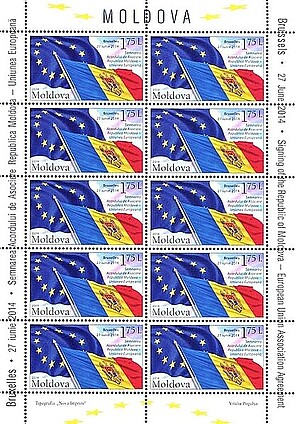
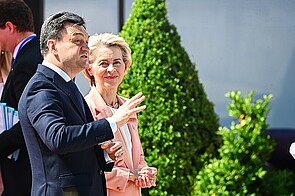
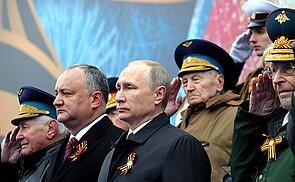
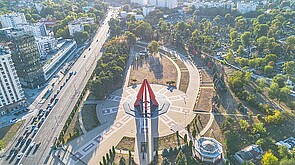
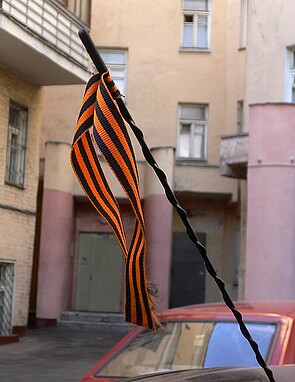
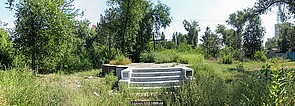
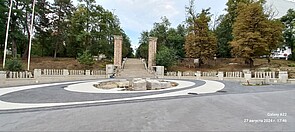
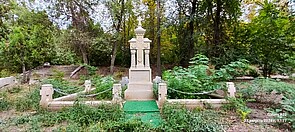
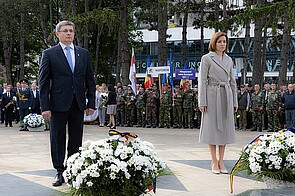
Anastasia Felcher · 19.09.2022
The 1990–92 Armed Conflict at the Dniester River: Continuous Memory Confrontation
Read more
Get this article as PDF download (including pictures).